Online Arbitrage vs Retail Arbitrage on Amazon
Download Amazon Seller Guide
This guide will help you get started, understand the basics of Amazon selling, and explain in simple words how it all works.
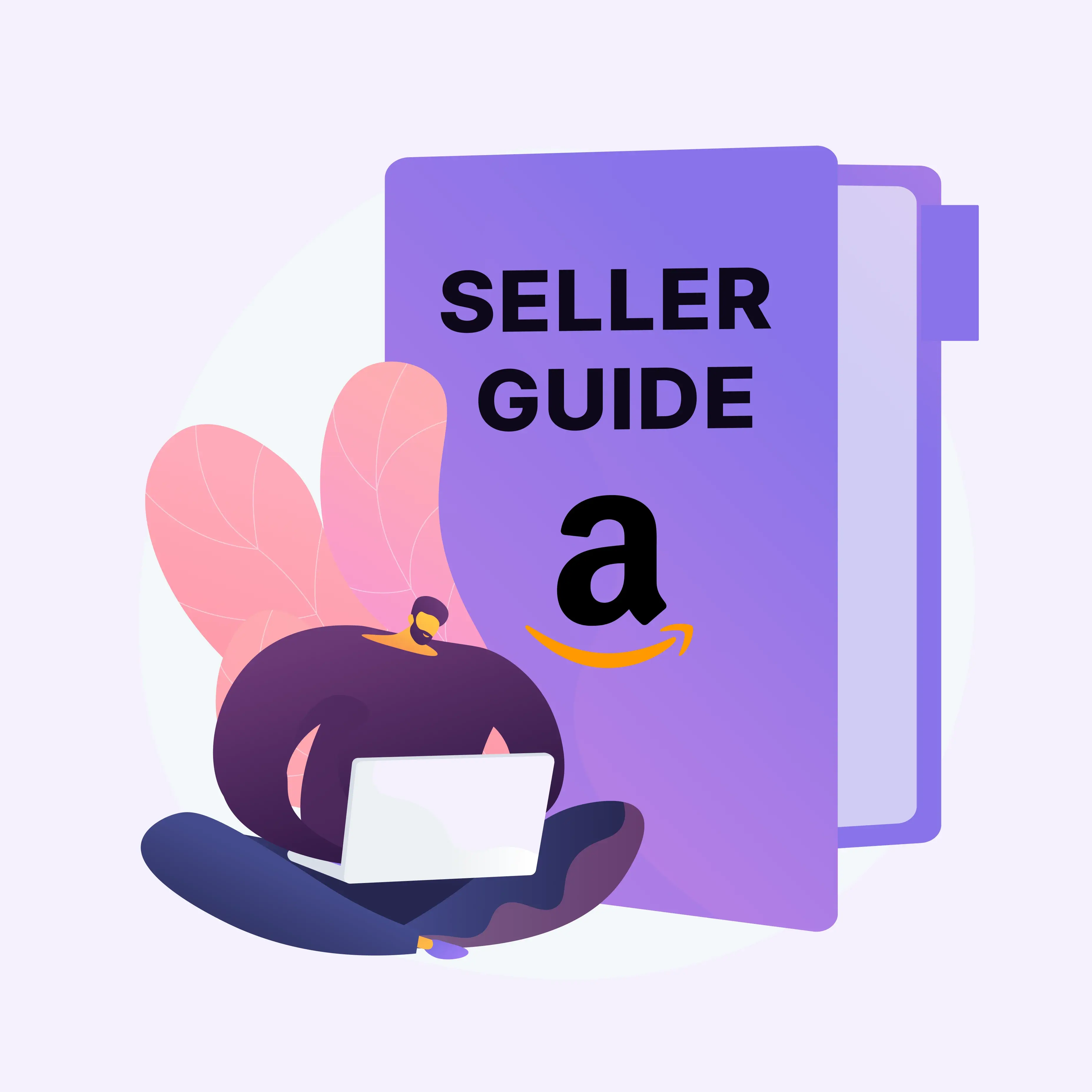
If you’re selling on Amazon, you’ve probably heard about retail arbitrage and online arbitrage. Both are popular ways to find products to resell, but they work a little differently.
With retail arbitrage, you visit local stores to find discounted items you can flip on Amazon. Online arbitrage, on the other hand, lets you source deals from online stores without leaving your house. So, which method is better for your Amazon FBA business?
In this post, we’ll break it all down, compare the two, and help you decide which strategy fits your goals.
What Is Amazon Online Arbitrage?

Amazon online arbitrage is a business strategy where sellers purchase discounted products from online stores or marketplaces and resell them on Amazon for a profit. The idea is simple: find items online being sold at a lower price, buy them, and then list them on Amazon for more.
Unlike retail arbitrage, which involves going to physical stores like Walmart or Target to hunt for deals, online arbitrage is entirely virtual. Sellers search for deals and discounts on websites from the comfort of their home. This makes it a time-saving and convenient option, especially for those who prefer not to deal with in-store shopping.
Online arbitrage doesn’t require large bulk purchases or supplier relationships like wholesale does, making it beginner-friendly. It’s also perfect for sellers who want to start on Amazon with a smaller budget, as they can purchase smaller quantities without committing to big investments upfront.
Example of online arbitrage
Imagine you’re browsing an online retailer and spot a best-selling toy on sale for $20.
- You buy 10 units of the toy for $20 each, spending $200.
- You list the toy on Amazon for $45 per unit.
- Once all 10 units sell, you make $450 in revenue.
- Profit
$450 − $200 = $250 (before subtracting Amazon fees, shipping, and other costs).
What Is Amazon Retail Arbitrage?
.webp)
Amazon retail arbitrage is a business model where sellers purchase discounted or clearance products from physical retail stores and resell them on Amazon for a profit. The goal is to find items being sold at a lower price in stores, buy them, and then list them on Amazon at a higher price.
Unlike online arbitrage, retail arbitrage involves visiting stores like Walmart, Target, or Ross to physically source products. This method can be ideal for sellers who enjoy hands-on shopping and scouting for deals.
Retail arbitrage doesn’t require forming supplier relationships or buying in bulk, making it beginner-friendly. However, it does involve more time and effort since sellers need to visit multiple stores and check their inventory in person.
Example of retail arbitrage
Let’s say you walk into a local Walmart and find a high-demand kitchen gadget on clearance for $15.
- You buy 10 units of the gadget for $15 each, spending $150.
- You list the gadget on Amazon for $35 per unit.
- After selling all 10 units, you earn $350 in revenue.
- Profit
$350 − $150 = $200 (before subtracting Amazon fees, shipping, and other costs).
Amazon Online Arbitrage vs. Retail Arbitrage: Key Differences
Both online arbitrage and retail arbitrage are great ways to source products for your Amazon business. However, they differ in sourcing methods, time commitment, and scalability.
Both methods have their strengths. If you value convenience and want to source from home, online arbitrage is the way to go. If you enjoy hands-on shopping and exploring local deals, retail arbitrage could be a better fit.
Here’s a detailed comparison to help you decide which one fits your business needs.
Online arbitrage vs. retail arbitrage

Product sourcing
Products are sourced from online retailers and e-commerce sites like Walmart.com, Target.com, or Overstock.com. Sellers search for discounted items, clearance deals, or price differences online.
- Retail arbitrage
Products are sourced in person by visiting physical retail stores like Walmart, Target, Ross, or thrift stores. Sellers search clearance aisles or look for local deals.
Convenience
Entirely virtual, allowing you to find deals from home. Ideal for those who prefer not to visit stores or spend time physically shopping.
- Retail arbitrage
Requires traveling to stores and browsing shelves in person. This can be more time-consuming and physically demanding.
Time commitment
Faster sourcing since you can browse multiple websites at the same time, search by categories, and use tools or software like Keepa or Tactical Arbitrage for efficiency.
- Retail arbitrage
Takes more time since you have to drive to stores, explore inventory, and manually evaluate products.
Product availability
Deal availability is highly competitive since online discounts are accessible to anyone. Items may sell out quickly due to competition.
- Retail arbitrage
Deals are more localized and unique to each store, making competition lower. However, inventory can vary widely by location.
Scalability
Easier to scale since you can source from a wider range of retailers online and even automate parts of the process with software.
- Retail arbitrage
Harder to scale because it requires physical effort and time, limiting how many stores you can visit in a day.
Startup costs
- Online arbitrage
Lower startup costs. You can start by purchasing small quantities from online retailers and gradually reinvest your profits. You can initially invest as low as $500.
- Retail arbitrage
Also low-cost, but you might need to buy more to maximize the value of in-store deals and make trips to stores worthwhile. Many sellers start with $500.
Competition
- Online arbitrage
High competition since anyone with internet access can spot the same deals. Tools like price tracking software can help, but fast action is necessary.
- Retail arbitrage
Lower competition because not everyone has access to local deals in your area.
Pros and Cons of Online and Retail Arbitrage
Both online and retail arbitrage can be effective ways to source products for Amazon. Both approaches let you find discounted products to resell for a profit, but they each come with their own strengths and challenges. Understanding the pros and cons of each can help you choose the best fit for your goals and resources.
Pros of online arbitrage
.webp)
- Convenience of sourcing from home
Online arbitrage allows you to shop for deals without leaving your house. You can browse multiple websites and find discounts anytime, saving time and effort.
- Access to a wider range of products
You’re not limited to local inventory; online arbitrage gives you access to deals from nationwide or even global retailers. This opens up more opportunities to find profitable items.
- Easier to scale with automation tools
Product sourcing software like Seller Assistant help you automate deal searches, price tracking, and product research. This makes it easier to grow your business quickly.
- Flexible startup costs
You can start small with a few items and gradually scale as you reinvest your profits. There’s no need for bulk purchasing or large upfront investments.
Note. Seller Assistant is a comprehensive product-sourcing software that helps Amazon sellers quickly find high-profit deals. It combines three extensions: Seller Assistant Browser Extension, and IP-Alert Chrome Extension by Seller Assistant, and VPN by Seller Assistant, Amazon seller tools: Price List Analyzer, Brand Analyzer, Seller Spy, Bulk Restrictions Checker, and API integrations, and features: Side Panel View, FBM&FBA Profit Calculator, Quick View, ASIN Grabber, UPC/EAN to ASIN converter, Stock Checker, IP Alert, and Restrictions Checker.
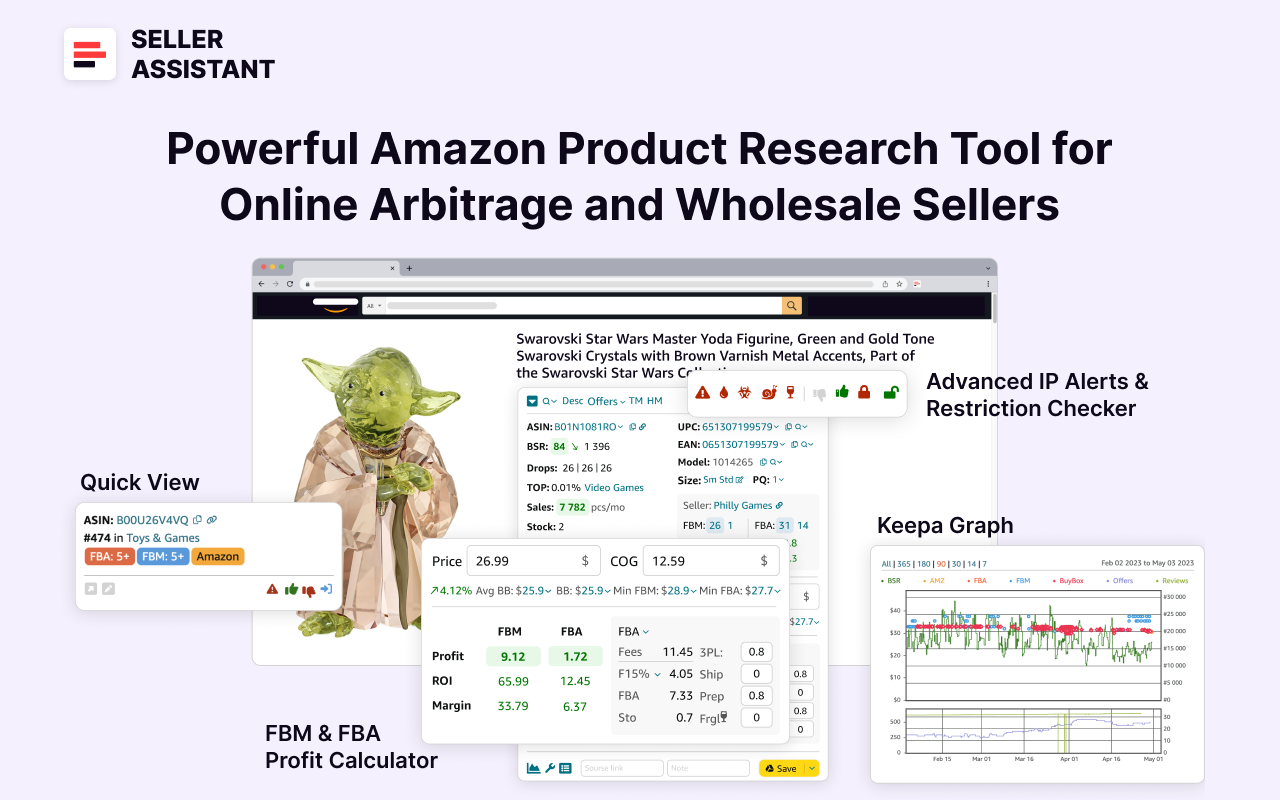
Seller Assistant shows all essential product data on Amazon search, product, and inventory pages, and on any website to help you find high-margin deals. By using this FBA and FBM product sourcing software, you can easily identify products that have the potential to be sold well on Amazon.
Related: Amazon FBA for Beginners
Selling on Amazon: How to Make Money?
How to Sell on Amazon for Beginners - Complete Guide
Cons of online arbitrage
.webp)
- High competition for online deals
Many sellers use online arbitrage, so deals are often highly competitive. Items can sell out quickly, and prices may fluctuate as more sellers list the same product.
- Time-intensive product research
Finding profitable deals for online arbitrage requires a lot of time and effort. Success depends on identifying high-demand products with strong profit potential, which involves constant research and analysis. However, product sourcing tools like Seller Assistant help simplify this process.
- Unstable profit margins
Amazon prices can fluctuate significantly due to intense competition among sellers. This unpredictability makes it difficult to consistently achieve the expected profits and estimate margins over the long term.
- Restrictions on certain products
Amazon has restricted categories and brands that require approval to sell. If you’re not eligible to sell certain items, you won’t be able to list them on your account. It’s crucial to check eligibility and restrictions before purchasing products to avoid being stuck with unsellable inventory.
Pros of retail arbitrage

- Lower competition for local deals
In-store deals are often unique to specific locations, which means fewer sellers will have access to the same inventory. This can help you avoid price wars.
- Hands-on product evaluation
You can inspect items in person to ensure they’re in good condition and meet Amazon’s requirements for resale. This reduces the risk of purchasing unsellable items.
- Immediate access to inventory
With retail arbitrage, you can purchase items and list them on Amazon the same day. There’s no waiting for shipping or dealing with delays.
- Great for beginners with limited resources
You can start with a small budget and gradually expand as you learn the ropes. Retail arbitrage is accessible to those just starting out.
Cons of retail arbitrage

- Time-consuming process
Visiting multiple stores and searching for deals takes significant time and effort. This limits how quickly you can source products.
- Inconsistent product availability
Discounted items may not always be restocked, making it difficult to find the same profitable products repeatedly.
- Harder to scale
Scaling a retail arbitrage business is challenging because it requires more physical effort and time to source products.
- Travel costs add up
Gas, transportation, and time spent traveling between stores can eat into your profits, especially if deals are far apart.
What Is More Profitable - Online or Retail Arbitrage?
The profitability of online and retail arbitrage depends on various factors like your time, resources, and sourcing strategy. Both methods can be lucrative if done correctly, but their profit potential varies based on the seller’s approach.
Online arbitrage: profitability overview
Online arbitrage can yield higher profits due to its scalability and access to nationwide or global deals. Sellers can use automation tools like Seller Assistant to find products faster and analyze profitability before buying. However, intense competition online can drive down prices, making profit margins unstable for certain products.
When online arbitrage is more profitable
- You use software like Seller Assistant to streamline product research.
- You use competitor research tools to sell the best-selling products your competitors sell.
- You avoid products with high competition and focus on niche categories.
Retail arbitrage: profitability overview
Retail arbitrage can be highly profitable due to lower competition for local deals and unique inventory found in clearance aisles or local sales. Because fewer sellers can access these deals, price wars are less common, and profit margins may remain stable. However, retail arbitrage can be time-intensive, and profitability depends on finding consistent inventory in nearby stores.
When retail arbitrage is more profitable
- You have access to multiple stores in your area.
- You’re skilled at identifying hidden clearance deals.
- You enjoy hands-on sourcing and can spot quality items in person.
Key takeaway
Neither method is inherently more profitable – it depends on your ability to source products effectively and manage costs like shipping, fees, and travel expenses.
- Choose online arbitrage if
You value scalability, access to a broader product range, and automation tools.
- Choose retail arbitrage if
You prefer localized deals, hands-on shopping, and potentially more stable profit margins.
What to Sell with Online Arbitrage?
Finding profitable products is the key to success in online arbitrage. The right product choices can maximize your profits and help scale your Amazon business. Tools like Seller Assistant make it easier to discover high-margin products, avoid risky items, and stay ahead of the competition.
Here are 5 strategies to research best-selling online arbitrage deals.
Strategy 1. Automated brand research
- What it is
Automated brand research uses data-driven tools to identify profitable brands that sell well on Amazon. It helps sellers focus on trusted, high-demand brands for their inventory.
- What it achieves
This strategy identifies brands with strong sales, low competition, and high customer satisfaction. By targeting brands with positive feedback and scalable product lines, sellers can reduce risks and increase profits.
- How it works
With tools like Seller Assistant's Brand Analyzer, you can evaluate a brand’s sales data, pricing trends, customer reviews, and competition levels. It also helps you avoid markets dominated by Amazon, ensuring less competition.

Effective research tips
- Sales performance
Look for brands with consistent revenue trends.
- Competition level
Avoid brands where Amazon holds over 30% of sales.
- Product range
Focus on brands offering 200+ products for more opportunities.
- Customer feedback
Target brands with an average rating of 4 stars or higher.
- Restrictions
Use Seller Assistant’s Bulk Restriction Checker to confirm that products are eligible for resale. Upload your product list to verify eligibility.

- Best for
Online arbitrage sellers who want to sell well-known, high-demand brands.
Strategy 2. Automated price list scanning
- What it is
This strategy involves scanning product price lists from online retailers to quickly identify profitable items. It’s perfect for analyzing bulk product data without manually checking every item.
- What it achieves
It allows sellers to filter out low-margin or high-risk products and focus on items that offer solid profits with low competition.
- How it works
Upload product lists from retailer websites into Seller Assistant's Price List Analyzer. The tool matches items with Amazon listings, calculates profitability, and flags any restrictions or deal risks.
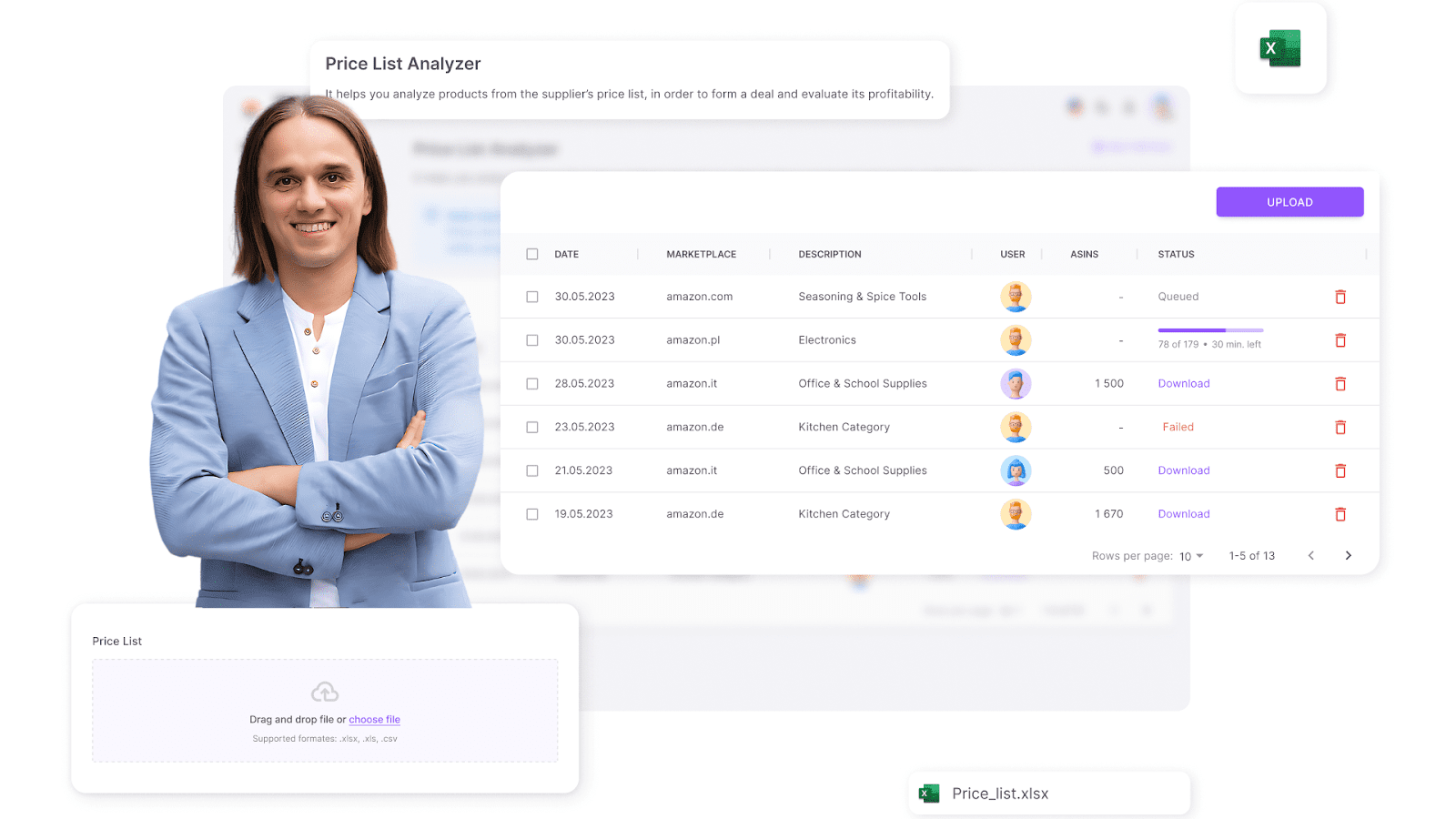
Effective research tips
- Sales performance
Check the Best Sellers Rank (BSR) to verify demand. 1 to 200,000 is typically a “good” BSR with 1 being a best-seller in its category.
- Competition level
Avoid listings with more than 15 sellers or dominated by Amazon.
- Buy Box chances
Analyze Buy Box ownership to evaluate your chances of winning it.
- Profitability
Review ROI, margins, and breakeven points for each product.
- Restrictions and IP complaints
Check product restrictions in Price List Analyzer to avoid (or be informed about) gated categories and use Seller Assistant’s IP-Alert® Extension to detect Amazon policy violations.

- Best for
Online arbitrage sellers managing bulk product sourcing from retailer websites.
Strategy 3. Research competitors to sell what they sell
- What it is
Competitor research involves analyzing successful Amazon sellers to identify what products they’re selling profitably. This strategy helps you tap into proven market trends.
- What it achieves
By tracking competitor listings, you can discover top-performing products to add to your own inventory and benefit from existing demand.
- How it works
With tools like Seller Assistant’s Seller Spy, you can monitor competitor activity, including new product additions, pricing strategies, and sales performance.
.png)
Effective research tips
- New product monitoring
Track competitors’ new listings to spot trends early.
- Product removals
Avoid declining markets by analyzing which items competitors stop selling.
- Seller feedback
Review competitor feedback to identify high-quality products.
- Pricing strategies
Stay competitive by monitoring competitor prices.
- Best for
Online arbitrage sellers looking for proven, profitable products.
Strategy 4. Find deals with in-depth product research
- What it is
This strategy involves manually analyzing individual products for profitability, competition, and potential risks. It’s ideal for sellers who prefer hands-on product selection.
- What it achieves
Thorough research ensures that every product you list is profitable, meets Amazon’s selling guidelines, and has low risk.
- How it works
Use the Seller Assistant Extension for real-time data on product performance, competition, and risks. This tool integrates with Amazon product pages, supplier sites, and competitor storefronts to provide instant insights.

Effective research tips
- Sales performance
Target products with a BSR between 1–200,000.
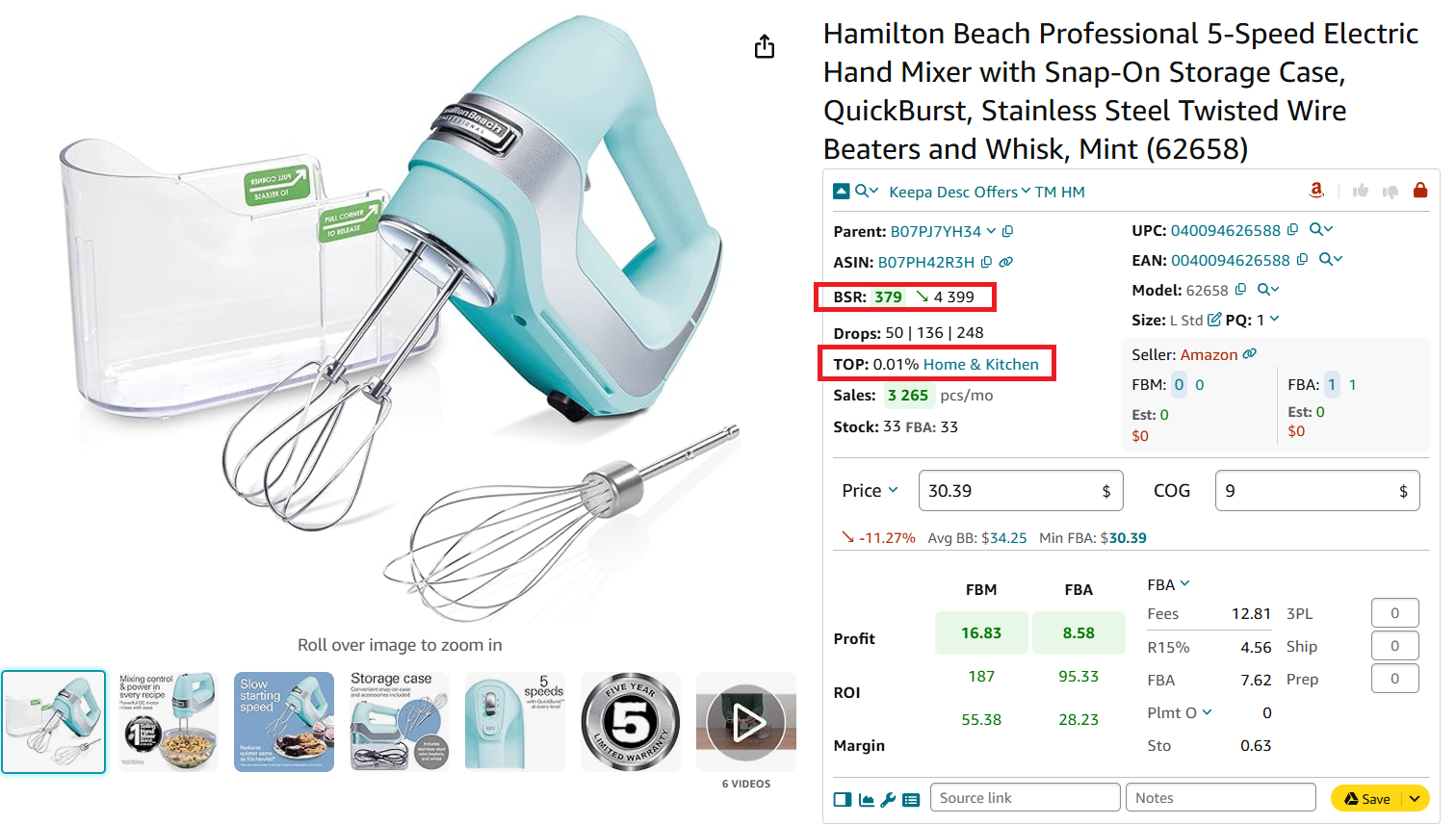
- Competition analysis
Choose products with 2–15 sellers for balanced competition.
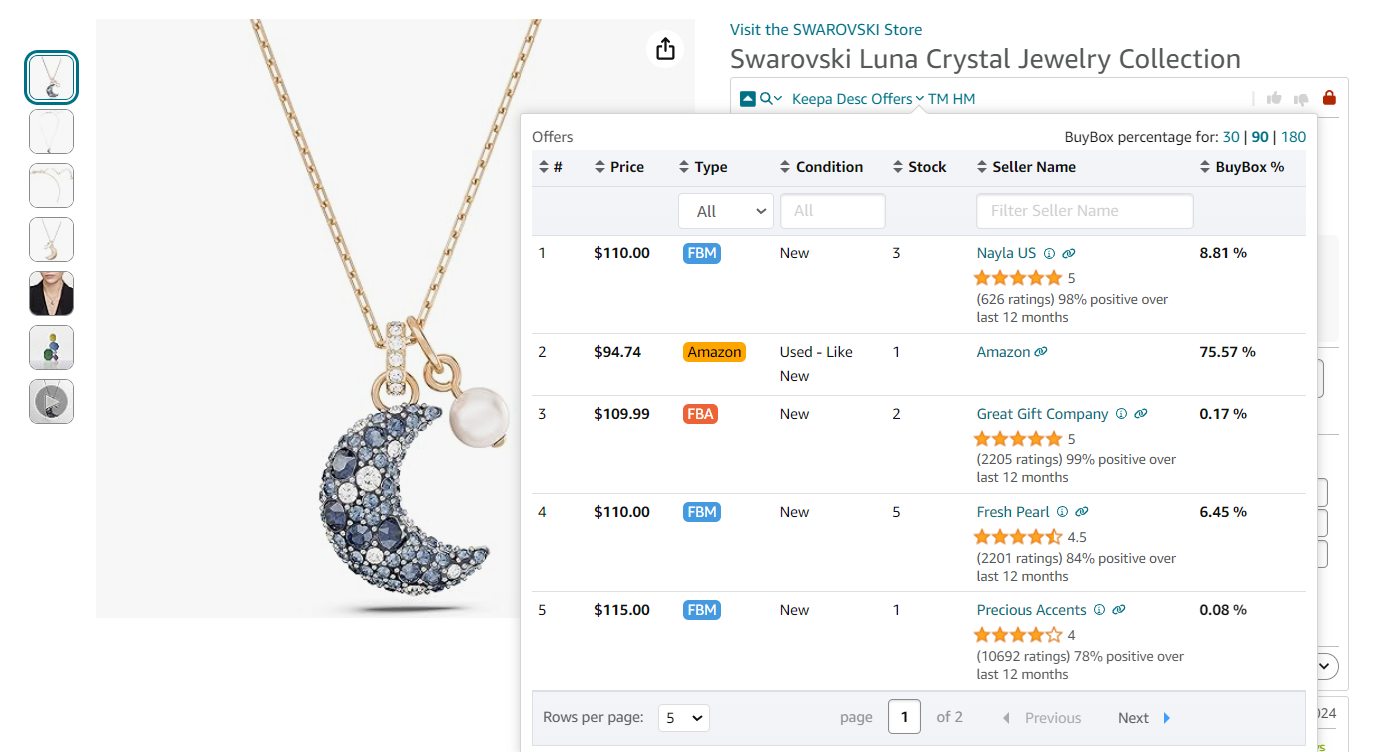
- Amazon presence
Avoid listings where Amazon is a Buy Box seller.

- Profitability metrics
Use the FBM&FBA profit calculator to analyze ROI, margins, and breakeven points.
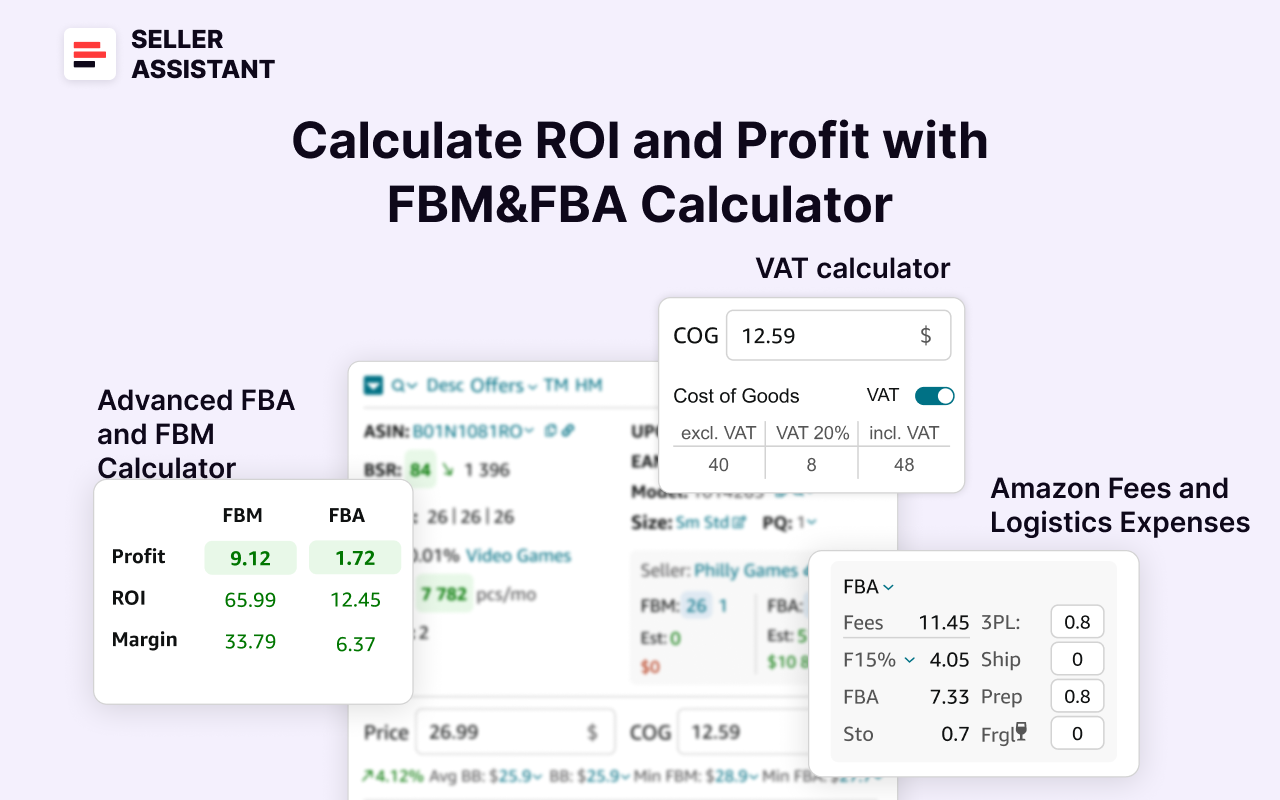
- Risk assessment
Check for restrictions, IP complaints, or risky factors like fragile, hazardous materials, etc.

- Historical data
Review Keepa charts to evaluate pricing trends and long-term demand. If a product is new, it’s difficult to estimate its sales potential.

- Best for
Online arbitrage sellers requiring detailed profit analysis for their inventory.
Strategy 5. Automate competitor storefront research with Storefront Widget
- What it is
Seller Assistant’s Storefront Widget is a competitor analysis feature that automates competitor storefront research.
- What it achieves
It integrates directly into Amazon storefront pages, offering an interactive way to analyze competitor stores and find profitable products.
- How it works
Storefront Widget automatically appears on an Amazon seller storefront page, providing competitor insights at a glance.

To use the feature, go to a competitor’s storefront on Amazon. Storefront Widget will automatically load, showing storefront summary statistics. Analyze competitor data and filter results by category or brand.
Effective product research tips
- Discover untapped brands
Find trending brands and products in competitor stores to expand your product range wisely.
- Identify best-selling competitor deals
Use Storefront Widget’s sales estimates and BSR, Top BSR, and profitability data to find most popular competitor products you don’t sell
- Analyze competitor store strategies
Discover which brands, categories, and pricing strategies work best for your competitors to refine your own approach.
- Avoid risky products before you buy
Check potential deals for product restrictions, hazmat and other flags, and IP complaints to prevent costly mistakes.
Best for
Amazon online arbitrage, dropshipping, and wholesale sellers.
Online vs. Retail Arbitrage: What Is the Best Choice?
.webp)
Choosing between online arbitrage and retail arbitrage for your Amazon business can feel challenging, as both models offer unique advantages.
The right choice depends on your resources, goals, and preferences. Below, we’ll outline the key criteria to help you decide which business model suits you best.
Time commitment: online sourcing vs. in-store shopping
Online arbitrage is more time-efficient, as you can browse multiple retailers online and even use automation tools to streamline your research. Retail arbitrage requires more time for travel and in-store visits, making it better for those who enjoy hands-on sourcing.
Startup costs: flexible budgets vs. larger trips
Both models are affordable to start, but online arbitrage allows you to begin with smaller purchases from online retailers. Retail arbitrage may involve buying in bulk during in-store sales or traveling to multiple locations, which can increase initial expenses.
Convenience: work from home vs. on-the-go sourcing
If you prefer working from home, online arbitrage is the clear winner, offering the ability to source products from anywhere with an internet connection. Retail arbitrage requires physical shopping, which may appeal to those who enjoy the thrill of hunting for deals in stores.
Competition: online deals vs. local finds
Online arbitrage often has higher competition since deals are accessible to everyone on the internet. Retail arbitrage benefits from lower competition, as local deals are harder for other sellers to access.
Scalability: automation vs. physical limits
Online arbitrage is easier to scale thanks to tools that automate product research and sourcing. Retail arbitrage is harder to scale due to the time and physical effort required to visit multiple stores and source inventory.
Product availability: broad reach vs. local inventory
Online arbitrage gives you access to products nationwide or even internationally, offering more sourcing options. Retail arbitrage limits you to what’s available in your local area, which can restrict inventory variety.
Profit stability: price competition vs. unique local deals
Online arbitrage prices are often more volatile due to competition among sellers, which can lead to fluctuating profit margins. Retail arbitrage typically offers more stable profits, as local deals face less competitive pressure.
FAQ
What is the main difference between online arbitrage and retail arbitrage?
Online arbitrage involves sourcing discounted products from online retailers, while retail arbitrage requires physically visiting stores to find deals. The key difference is that online arbitrage can be done from home, whereas retail arbitrage is more hands-on.
What is easier for beginners to start - online or retail arbitrage?
Both methods are beginner-friendly, but online arbitrage may be simpler due to tools that streamline product research. Retail arbitrage, however, allows for hands-on inspection, which some beginners may find reassuring.
Can I scale my Amazon business with retail arbitrage?
Scaling a retail arbitrage business is possible but challenging due to the time and physical effort involved in sourcing inventory. Online arbitrage offers better scalability with automation tools that speed up research and sourcing.
Are the startup costs different between online and retail arbitrage?
Both models have low startup costs, but online arbitrage offers more flexibility to start with smaller purchases. Retail arbitrage may require more spending on gas, travel, and bulk deals during in-store sales.
Which is more profitable: online arbitrage or retail arbitrage?
Profitability depends on how efficiently you source products and manage competition. Online arbitrage can be lucrative with nationwide deals and tools, while retail arbitrage benefits from less competition and unique local finds.
Final Thoughts
In conclusion, both online and retail arbitrage are viable strategies for building a successful Amazon business, each with its own set of advantages and challenges. Online arbitrage offers convenience, scalability, and access to a broader range of products, while retail arbitrage provides hands-on sourcing and less competition for local deals.
The best choice ultimately depends on your goals, budget, and preferences. Start small, stay consistent, and choose the model that aligns best with your resources and lifestyle.
Use product sourcing tools to simplify your product selection. The best product sourcing tool is Seller Assistant. Seller Assistant is an all-in-one product sourcing software offering all the features vital for product sourcing.
It combines three extensions: Seller Assistant Extension, IP Alert, and VPN by Seller Assistant, tools: Price List Analyzer, Brand Analyzer, Seller Spy, Bulk Restrictions Checker, and API integrations, and features: Storefront Widget, Side Panel View, FBM&FBA Profit Calculator, Quick View, ASIN Grabber, UPC/EAN to ASIN converter, Stock Checker, and other features that help quickly find high-profit deals. Seller Assistant also offers integration with Zapier allowing to create custom product sourcing workflows.

.svg)














